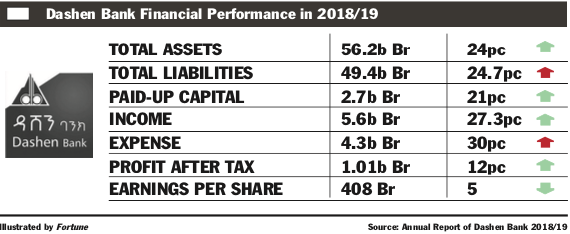
Two private banks became the first financial institutions to transact on an electronic platform managed by the Ethiopian Securities Exchange (ESX) and developed by Info-Tech Group.
In an initial auction where participants offered a total of 6.1 billion Br, Wegagen Bank extended a 50 million Br overnight loan to Awash International Bank (AIB). The interest rate on the transaction was set at three percentage points above the National Bank of Ethiopia's (NBE) base policy rate of 15pc, marking the country's move toward an interest-rate-based monetary framework. The shift is directed by Governor Mamo Mihretu, who views the platform as a major stride toward financial stability.
"It's a significant advancement for our financial system," Governor Mamo told Fortune. "The online interbank market will enable banks to manage their liquidity more effectively."
The ESX platform is designed to facilitate daily lending and borrowing among banks, with maturities ranging from one or seven days. It offers a centralised digital marketplace where banks can post their cash availability, interest rates, and maturity dates. Other banks are required to respond to these postings within 24 hours, facilitating a more efficient and transparent financial ecosystem.
"All banks can participate in the trading now," said Tilahun Kassahun (PhD), CEO of ESX. "The platform's transparent setup will promote trust among banks and create a centralised price discovery mechanism for the financial sector."
The NBE has set an interest rate corridor for these transactions, capping rates at three percentage points above or below the base rate. The mechanism is intended to facilitate price discovery while limiting interest rate volatility. According to a directive issued by the NBE three months ago, trades are limited to overnight or seven-day terms, with a minimum transaction size of 25 million Br.
Last week, NBE invited five banks — Commercial Bank of Ethiopia (CBE), Hibret Bank, Gadaa Bank, Awash Bank, and Wegagen Bank — to a pilot trial of the electronic platform. These banks have since been engaging in short-term trades using liquidity from their reserves, testing the market through overnight quotes.
"Although we initially intended to lend, we found ourselves borrowing," said Awash Bank's Chief Financial Officer (CFO), Birhanu Balcha.
He considers the market a promising platform for addressing short-term liquidity needs while allowing banks to use idle funds effectively.
"We anticipate taking turns on both ends of these transactions," he told Fortune.
Awash Bank recently borrowed an additional 25 million Br from another commercial bank, demonstrating the platform's potential to facilitate liquidity in the banking industry. However, Birhanu was candid about his concerns over market stability, particularly when all banks might experience liquidity crunches, and no single bank can act as a lender.
"If every bank is stressed, the system itself could be strained," he said.
The platform's introduction comes at a time when liquidity concerns have dominated industry-wide discussions. A Central Bank report from last June revealed that 56.3pc of total deposits, amounting to over two trillion Birr, were held by a mere 0.5pc of depositors. The report uncovered that if the 10 largest depositors were to withdraw their funds simultaneously, nearly two-thirds of commercial banks would suffer a bank run, posing a systemic risk to the industry.
The interbank platform is expected to reduce such systemic risks by facilitating online money trading and providing a centralised structure for liquidity management. The ESX offers live transactions, enabling commercial banks to initiate short-term trading to balance liquidity in the banking ecosystem.
"We've seen substantial liquidity enter the market, particularly from the state-owned bank," said ESX's CEO, Tilahun.
He expects that transaction fees generated from this platform will eventually contribute to ESX's revenue stream. Fees will be determined in agreement with the NBE, banking institutions, and the exchange itself. While the Central Bank will oversee the platform during its early stages, the Ethiopian Treasury Association, composed of treasurers from the banks, will later take over compliance responsibilities. The NBE has committed to publishing the interest rates at which banks transact, though the identities of trading parties will remain confidential.
However, the interest-based system currently excludes interest-free banks from participating, a point of contention for some in the industry.
"Interest-free banks are left out of this liquidity source," said Dawit Keno, president of Hijra Bank.
He acknowledged the Central Bank's pledge to develop a Sharia-compliant platform to allow participation from interest-free banks but conceded the difficulties involved.
"Conventional banks lack the structural foundation for managing liquidity separately, which is necessary for this platform," Dawit said. "We're under the same liquidity pressures as other banks."
Financial consultants such as Mered B. Fikreyohannes applauded the move as a step toward a vibrant financial market.
"It's a crucial shift to stabilise the financial system, correcting price distortions that have plagued the sector for years," he told Fortune.
According to Mered, aligning short- and long-term interest rates will help address negative real interest rates, which he attributed to longstanding distortions in the financial sector.
"The Central Bank is cautious on direct lending to encourage interbank transactions while keeping inflation in check," he said. "It's a wise move from a modern monetary policy perspective."
The transition to a price-based monetary policy departs from the NBE's traditional approach and is part of a broader three-year strategy. Governor Mamo expects robust banks, including state-owned ones, to bring substantial liquidity to the open financial market. He urged the "transformative step" to help banks manage their liquidity more effectively.
"It's a major step toward financial stability," he told Fortune.
The platform is expected to facilitate online money trading and reduce systemic risks by providing a centralised structure for liquidity management. ESX's CEO, Tilahun, believes the platform lays the foundation for price discovery, which will be critical as Ethiopia moves toward developing a full-fledged capital market.
"We're thrilled that ESX's state-of-the-art trading platform is advancing this national endeavour," the ESX said in a post on X, formerly known as Twitter. "We're honoured to be part of this historic milestone."
PUBLISHED ON
Nov 03,2024 [ VOL
25 , NO
1279]

Fortune News | Sep 06,2020

View From Arada | Apr 09,2023

Fortune News | Feb 15,2020

Radar | Nov 27,2021

Fortune News | Jun 10,2023

Delicate Number | Sep 28,2024

Radar | Aug 18,2024

Radar | Dec 08,2024

Radar | Jul 17,2022

Fortune News | Sep 15,2025

Dec 22 , 2024 . By TIZITA SHEWAFERAW
Charged with transforming colossal state-owned enterprises into modern and competitiv...

Aug 18 , 2024 . By AKSAH ITALO
Although predictable Yonas Zerihun's job in the ride-hailing service is not immune to...

Jul 28 , 2024 . By TIZITA SHEWAFERAW
Unhabitual, perhaps too many, Samuel Gebreyohannes, 38, used to occasionally enjoy a couple of beers at breakfast. However, he recently swit...

Jul 13 , 2024 . By AKSAH ITALO
Investors who rely on tractors, trucks, and field vehicles for commuting, transporting commodities, and f...

Oct 11 , 2025
Ladislas Farago, a roving Associated Press (AP) correspondent, arrived in Ethiopia in...

Oct 4 , 2025
Eyob Tekalegn (PhD) had been in the Governor's chair for only weeks when, on Septembe...

Sep 27 , 2025
Four years into an experiment with “shock therapy” in education, the national moo...

Sep 20 , 2025
Getachew Reda's return to the national stage was always going to stir attention. Once...